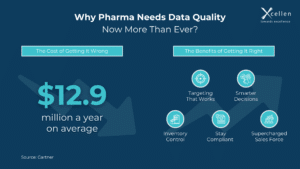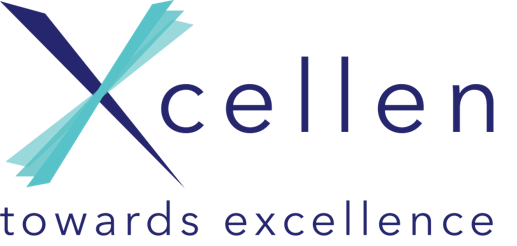The Importance of Data Quality in Pharma Commercialization
Data is essential for several reasons in the life sciences industry. With the dominance of digital channels globally, it is becoming paramount for pharma businesses to take a data-first approach to reach their customers. Today, accurate, high-quality data is needed to make informed decisions, reach target audiences, enhance healthcare provider (HCP) targeting, and comply with strict industry regulations.
However, the overall pharma commercial landscape is fraught with data management challenges, creating the necessity for solutions that prioritize data accuracy at every step. Throughout this blog, we’ll explore the unique issues faced by the life sciences ecosystem and how Xcellen empowers businesses to leverage advanced analytics for pharma sales teams to achieve commercial excellence and optimize their sales force effectiveness (SFE).

Why is High Quality Data So Important in the Pharmaceutical Industry?
It isn’t just good business practice, it’s the backbone of success in pharmaceutical and life
sciences marketing and sales strategies.
1. Targeting and Segmentation
Commercial success in the life sciences hinges on identifying, segmenting, and engaging the right audience. High-quality data fuels customer segmentation, allowing companies to pinpoint their ideal healthcare providers (HCPs) and patient populations. A robust segmentation strategy makes targeted HCP engagement possible. It ensures that marketing materials and sales efforts resonate with the audiences who are most likely to benefit from and prescribe your offerings.
Low-quality or incomplete data can lead to wasted marketing spend and missed opportunities. Instead, establishing strong commercial data governance ensures that the efforts target the right HCPs, convert leads efficiently, and boost overall ROI.
2. Insights and Strategic Decision Making
Beyond segmentation, accurate data drives sophisticated market intelligence and data-driven sales strategies. Companies can detect market trends, analyze evolving consumer behaviors, benchmark against competition, and fine-tune product positioning, directly feeding into a dynamic and effective marketing strategy.
By leveraging real-world health data insights and big data in pharmaceutical sales, manufacturers can preemptively respond to market shifts. Thus, pivot strategies promptly, giving them an edge over competitors
3. Sales Forecasting and Inventory Management
Reliable data shapes the internal operational dynamics through accurate sales forecasting and pharmacy inventory optimization. Improving ROI is only achievable when organizations can predict future demands precisely, minimizing out-of-stock scenarios while avoiding overproduction.
Data integrity directly impacts profitability and ensures products are always available when HCPs and patients need them most. Advanced analytics play a crucial role in forecasting by interpreting vast datasets for precise sales predictions
4. Compliance and Regulatory Requirements
Pharmaceutical companies operate under one of the most stringent regulatory environments globally. Errors arising from poor data, such as inaccurate HCP lists, obsolete license information, or incorrect affiliations, may lead to significant fines and reputational damage.
Pharmaceutical data compliance doesn’t just protect against legal penalties, it strengthens trust with stakeholders, regulators, and patients alike. High-quality, validated datasets ensure that businesses stay compliant with regional and global data privacy laws such as GDPR and HIPAA.
5. Sales Force Effectiveness (SFE) Optimization
In a world where resources are finite, the effectiveness of the salesforce is a considerable determinant of success. Sales reps must be able to identify and prioritize the highest-value targets swiftly. Without clean and accurate data, SFE strategies falter, pushing sales reps toward unproductive calls and missed key engagements.
Through sales force effectiveness optimization, including data-enabled routing, call planning, and HCP profiling, companies ensure that their resources are deployed most efficiently, nurturing high-potential prescribers and boosting closure rates

Pharmaceutical Industry Data Management Challenges
Despite data being so central to success, the pharmaceutical industry faces distinct
challenges in ensuring data fidelity. Let’s explore some of the most pressing challenges:
1. Disparate Data Sources
Organizations often pull data from multiple sources: CRM systems, marketing platforms, RWE (Real World Evidence) datasets, third-party vendors, government registries, EMR (Electronic Medical Record) systems, and more.
The variety of formats, schemas, and standards creates data silos, making it incredibly
challenging to integrate and maintain a unified view.
2. Data Accuracy and Timeliness
Healthcare provider data changes frequently due to relocations, new affiliations, retirements, and more. Without real-time updates and third-party data validation, organizations risk operating with outdated or inaccurate information, leading to wasted resources and poor strategic decisions.
3. Regulatory Compliance
Data protection laws globally have become more complex. Ensuring that marketing and sales activities adhere to these legal requirements means organizations must institute updated processes for data de-identification, consent management, auditing, and tracking.
4. Inconsistent Data Enrichment
Not all datasets come enriched with complete and standardized information. Fields important for proper segmentation, such as specialty, treatment area, prescription behavior, and other demographic markers, may be absent or incomplete.
Without enrichment and cleansing, targeted HCP engagement becomes guesswork instead of science
5. Biased or Redundant Data
All data isn’t created equal. Some third-party datasets contain inherent biases due to uneven or inconsistent sampling (favoring certain specialties or geographies). Redundancies from overlapping datasets can also lead to overcounting or illusory market sizing.
Ensuring data accuracy through pharmaceutical data compliance protocols and verifying sources dynamically is necessary to mitigate these risks.
How Xcellen Empowers Businesses with Commercial Excellence Solutions
Understanding data challenges is only part of the equation; addressing them proactively
requires expert intervention.
At Xcellen, we believe in empowering businesses with cutting-edge solutions focusing on
Sales force effectiveness optimization.
Predictive Analytics & Sales Intelligence
Leveraging big data in pharmaceutical sales through predictive models allows us to forecast market dynamics months in advance. Our systems empower sales teams to prioritize HCPs with the highest potential impact, multiply their efficiency, and boost closure rates.
Best Practices for Ensuring Pharma Data Quality
Achieving and maintaining data hygiene requires systemic, organizational discipline. Here are the best practices every pharmaceutical company should follow:
1. Define Data KPIs: Regularly audit the accuracy, completeness, and consistency of your life sciences commercial data.
2. Centralize Data Sources: Eliminate data silos by adopting unified CRM architectures and centralized databases.
3. Automate Validation: Use AI-based third-party pharma data validation solutions for constant cleansing and monitoring.
4. Invest in Compliance: Regularly update privacy policies and data governance frameworks to align with evolving regulations.
5. Measure ROI: Attach tangible business outcomes such as sales growth, lower call costs, improved targeting, or inventory turnover to your data management initiatives.
6. Enable Continuous Training: Equip internal teams with knowledge about data stewardship and regulatory best practices.
Future Trends in Pharma Data Management
The landscape for pharma is rapidly evolving alongside technological disruption. Here’s what future-focused organizations should anticipate:
● Increased Reliance on AI and Machine Learning: From customer segmentation to predicting pharma sales trends, AI will power key decision-making.
● Wider Adoption of Blockchain for Data Integrity: Blockchain can ensure traceability, authenticity, and security in healthcare datasets.
● Expansion of Real-World Evidence (RWE) Sources: Real-world health data insights will become a core strategy for Big Pharma to enhance commercial success.
● Personalized Engagement at Scale: Hyper-targeted marketing campaigns customized for individual HCP preferences will be the new norm.
● Emphasis on ESG and Ethical Data Use: Pharma companies will be expected to maintain ethical responsibility in how data is collected, processed, and leveraged.
Conclusion
Ensuring data quality is non-negotiable for achieving commercial success. Whether it’s targeting healthcare providers more precisely, optimizing inventory management, complying with regulatory standards, or boosting the marketing ROI, clean, accurate, actionable data remains at the heart of it all.
Organizations willing to invest strategically in pharma commercial excellence solutions, rigorous third-party pharma data validation, and robust commercial data governance will be best positioned to win the increasingly competitive pharmaceutical marketplace.
At Xcellen, we are at the forefront of this transformation, helping forward-looking businesses harness the full potential of their data ecosystem.





